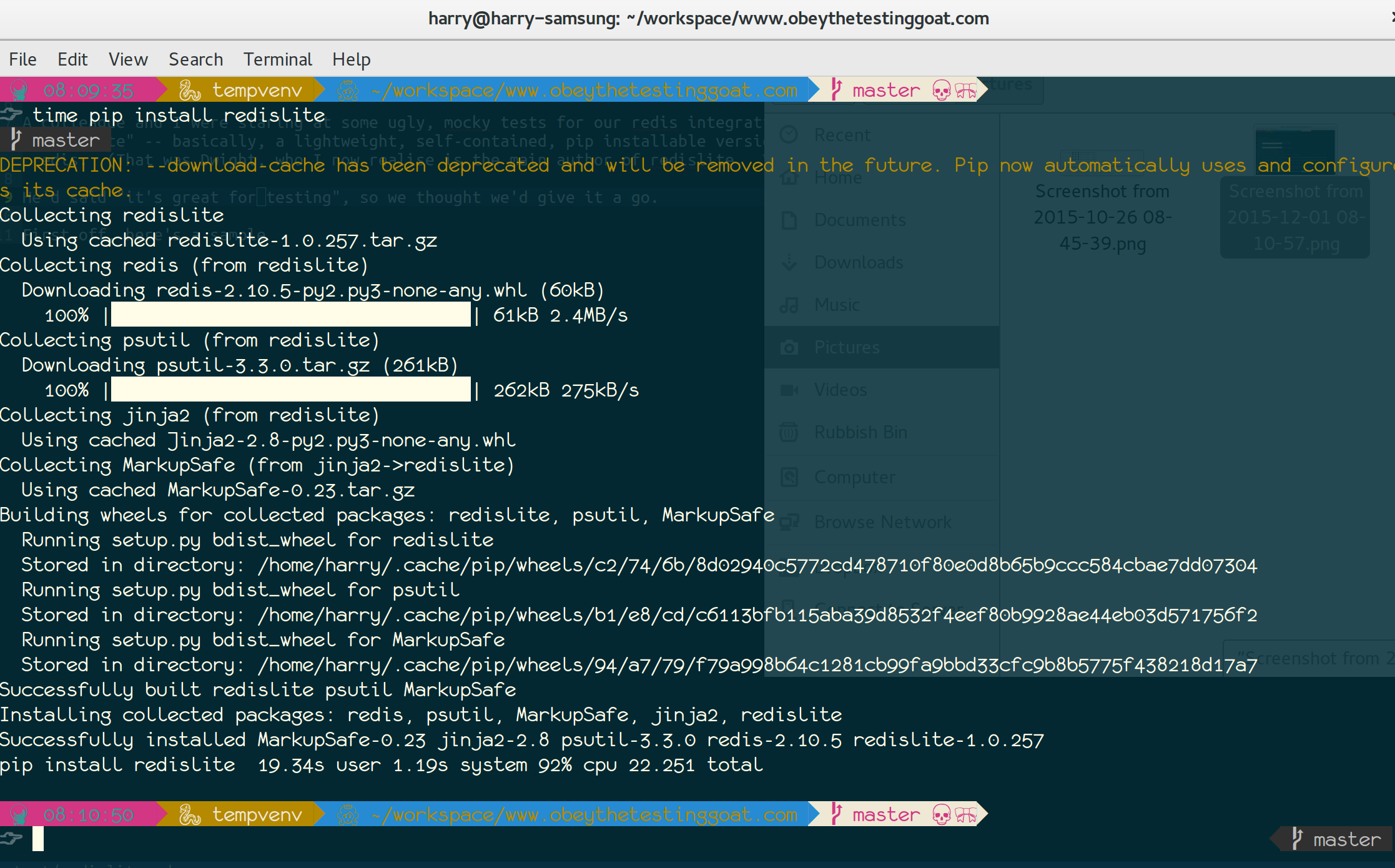A colleague and I were staring at some ugly, mocky tests for our redis integration the other day, when I remembered someone at Pycon last year showing me a cool library called redislite -- basically, a lightweight, self-contained, pip installable version of redis, that can be installed almost anywhere and run totally separately from the system redis. (That was Dwight, who I now realise is the main author of redislite. Yay Pycon.)
He'd said "it's great for testing", so we thought we'd give it a go.

Here's the sample usage from the docs:
>>> import redislite
>>> r = redislite.StrictRedis()
>>> r.set('foo', 'bar')
True
>>> r.get('foo')
'bar'
Couldn't be simpler! You can initiate a lightweight version of redis just like that, have one for each test even, and throw it away at the end, without having to worry about ports, passwords, or any interaction with the system redis.
The code under test is meant to parse a web server log line, and then update some hit counts in redis. Here's how our tests looked before:
@patch('hit_counter.redis')
def test_write_to_redis_updates_appropriate_keys(self, mock_redis):
write_to_redis('www.nowhere.com', datetime(2013, 11, 14, 16, 54, 21, 0), 2323)
self.assertItemsEqual(
mock_redis.method_calls,
[
call.incr('count|www.nowhere.com'),
call.incr('count|www.nowhere.com|2013'),
call.incr('count|www.nowhere.com|2013-11'),
call.incr('count|www.nowhere.com|2013-11-14'),
call.incr('count|www.nowhere.com|2013-11-14 16'),
call.incr('count|www.nowhere.com|2013-11-14 16:54'),
call.incrby('bytes|www.nowhere.com', 2323),
call.incrby('bytes|www.nowhere.com|2013', 2323),
call.incrby('bytes|www.nowhere.com|2013-11', 2323),
call.incrby('bytes|www.nowhere.com|2013-11-14', 2323),
call.incrby('bytes|www.nowhere.com|2013-11-14 16', 2323),
call.incrby('bytes|www.nowhere.com|2013-11-14 16:54', 2323),
]
)
And here's how they look after:
class WriteToRedisTest(unittest.TestCase):
def setUp(self):
self.fake_redis = redislite.StrictRedis()
self.patcher = patch('hit_counter.redis', self.fake_redis)
self.patcher.start()
def tearDown(self):
self.patcher.stop()
def test_increments_all_counts(self):
timestamp = datetime(2013, 11, 14, 16, 54, 21, 0)
expected_counts = [
'count|www.nowhere.com',
'count|www.nowhere.com|2013',
'count|www.nowhere.com|2013-11',
'count|www.nowhere.com|2013-11-14',
'count|www.nowhere.com|2013-11-14 16',
'count|www.nowhere.com|2013-11-14 16:54',
]
for key in expected_counts:
self.fake_redis.set(key, 11)
write_to_redis('www.nowhere.com', timestamp, 2323)
for key in expected_counts:
self.assertEqual(self.fake_redis.get(key), '12')
def test_increments_all_bytes(self):
timestamp = datetime(2013, 11, 14, 16, 54, 21, 0)
expected_bytes = [
'bytes|www.nowhere.com',
# etc
Look at that!
Instead of mocking the library, I'm mocking out a particular Redis instance, with a real, functioning redis that I have full control over
I now no longer need to care about exactly how I use the redis API in my code -- no need to check whether I'm calling incr or incrby, I can just set an actual value before, and check the actual value after. It allows me to obey one of the key rules of testing, "test behaviour, don't test implementation".
The approach only continued to deliver benefits. The reason we were looking at this code was because we wanted to start setting some expiry times on keys. As a result of using redislite, the tests for expiry came out really sane and readable:
def test_hourly_data_expires_after_one_week(self):
timestamp = datetime(2013, 11, 14, 16, 54, 21, 0)
write_to_redis('www.thing.com', timestamp, 123)
ttl = int(self.fake_redis.ttl('count|www.thing.com|2013-11-14 16'))
self.assertAlmostEqual(
ttl,
7 * 24 * 60 * 60,
delta=2,
)
Imagine that test with mocks!
self.assertItemsEqual(
mock_redis.method_calls,
[
call.incr('count|www.thing.com'),
call.incr('count|www.thing.com|2013'),
# ...
call.incr('count|www.thing.com|2013-11-14 16'),
call.expire('count|www.thing.com|2013-11-14 16', expected_expiry),
# and so on
Ugh. And that's glossing over the complexities of timestamping -- the assertAlmostEqual works nicely in the redislite tests, but here I'd have to either mock out datetime, or pull all of the call instances out of .method_calls one by one... Oh I just don't even want to think about it.
So, remember kids, friends don't let friends use mocks when there's a better alternative around. Definitely check out redislite if you ever find yourself writing some tests for a redis integration in your own codebase.
[thanks to Nicole for prompting me to write this post]
The book is available both for free and for money. It's all about TDD and Web programming. Read it here!
"Hands down the best teaching book I've ever read" — "Even the first 4 chapters were worth the money" — "Oh my gosh! This book is outstanding" — "The testing goat is my new friend" — Read more...
A selection of links and videos about TDD, not necessarily all mine, eg this tutorial at PyCon 2013, how to motivate coworkers to write unit tests, thoughts on Django's test tools, London-style TDD and more.
This is my old TDD tutorial, which follows along with the official Django tutorial, but with full TDD. It badly needs updating. Read the book instead!
The campaign page, preserved for history, which led to the glorious presence of the Testing Goat on the front of the book.
Comments
comments powered by Disqus